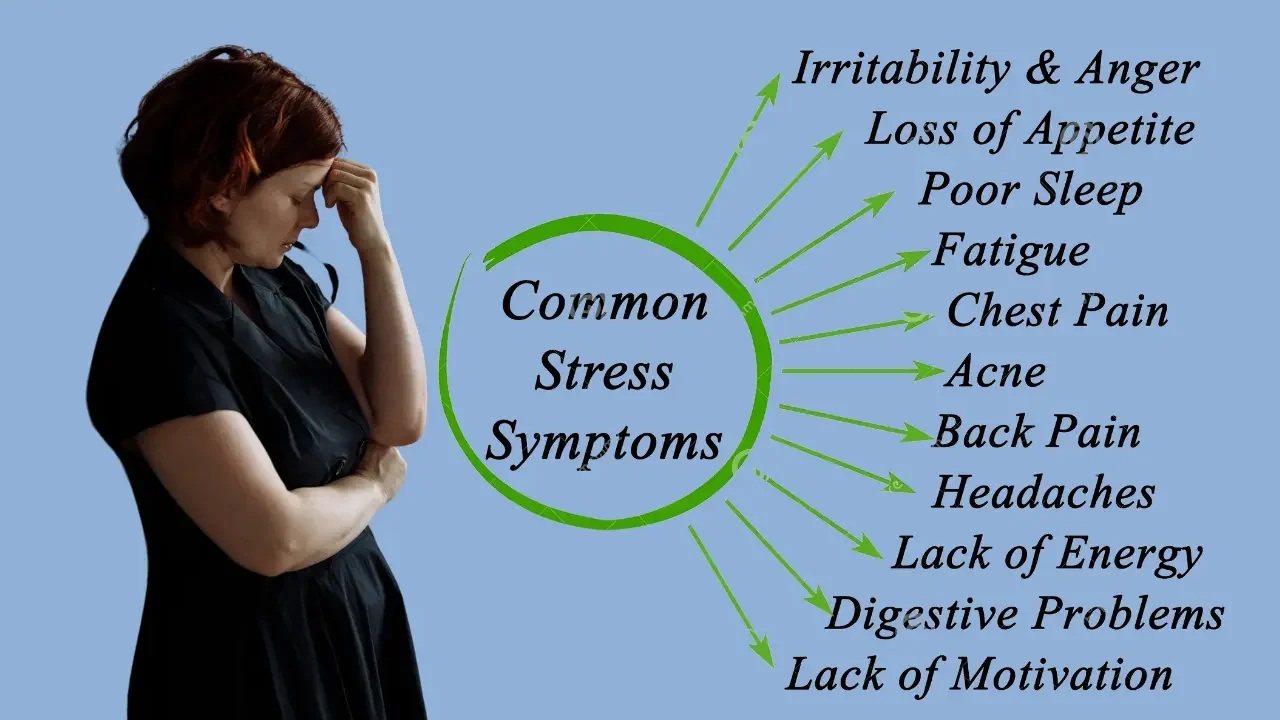Stress
Stress is a normal part of life that can either help us learn and grow or can cause us significant problems. Stress releases powerful neurochemicals and hormones that prepare us for action (to fight or flee). If we don’t take action, the stress response can create or worsen health problems. Prolonged, uninterrupted, unexpected, and unmanageable (uncontrollable) stresses are the most damaging. Stress can be managed by seeking support from loved ones, regular exercise, meditation, or other relaxation techniques, structured timeouts, and learning new coping strategies to create predictability in our lives.

There are two main types of stress:
Acute stress.
This is short-term stress that goes away quickly. You feel it when you slam on the brakes, have a fight with your partner, or ski down a steep slope. It helps you manage dangerous situations. It also occurs when you do something new or exciting. All people have acute stress at one time or another.
Chronic stress.
This is stress that lasts for a longer period of time. You may have chronic stress if you have money problems, an unhappy marriage, or trouble at work. Any type of stress that goes on for weeks or months is chronic stress. You can become so used to chronic stress that you don’t realize it is a problem. If you don’t find ways to manage stress, it may lead to health problems.
What is high blood pressure?
Narrow arteries create more resistance for blood flow out of the heart. The narrower your arteries, the more resistance there is, and the higher your blood pressure will be. Over the long term, the increased pressure can cause health issues, including heart disease.
Hypertension is quite common. Since guidelines changed in 2017, nearly half Trusted Source of American adults have high blood pressure, according to the American Heart Association.
Hypertension typically develops over several years, usually without causing any symptoms. But even without symptoms, high blood pressure can cause damage to your blood vessels and organs, especially the brain, heart, eyes, and kidneys.
Early detection is important. Regular blood pressure readings can help you and a doctor notice any changes. If your blood pressure is elevated, a doctor may have you check your blood pressure over a few weeks to see if the number stays elevated or falls back to typical levels.
Treatment for hypertension includes both prescription medication and healthy lifestyle changes. Without treatment, it could lead to health issues, including heart attack and stroke.

Can Stress Cause High Blood Pressure ?
Yes, stress can contribute to high blood pressure. When you experience stress, your body releases hormones like adrenaline and cortisol, which can temporarily raise your heart rate and blood pressure. If stress is chronic, it may lead to consistently high blood pressure. Additionally, stress can lead to behaviors that further increase blood pressure, such as poor diet, lack of exercise, smoking, or excessive alcohol consumption. Managing stress through techniques like mindfulness, exercise, and relaxation can help maintain healthy blood pressure levels.
How stress affects your health
We may feel emotional discomfort when faced with a stressful situation. Our bodies can react by releasing stress hormones into the blood. These hormones make the heart beat faster. They also constrict blood vessels to get more blood to your muscles so you’ll have more strength to react to the cause of the stress. This is called the “fight or flight” response.
These changes raise blood pressure temporarily. When the stress reaction goes away, blood pressure returns to its pre-stress level. This is called situational stress. Its effects are usually short-lived and go away when the stressful event is over.
“Fight or flight” is important when we are faced with a threat we can handle by confronting or fleeing. However, there are many stressful events that we can’t handle by fighting or leaving. Long-term stress can cause our bodies to go into high gear on and off for days or weeks at a time. The links between long-term stress and blood pressure are not clear and are still being studied.

What’s the connection between stress and high blood pressure?
If left untreated, chronic stress can also lead to higher blood pressure.
“Elevated blood pressure is a common side effect of stress. And because high blood pressure doesn’t typically cause symptoms, when it happens, we often have no idea,” Dr. Kayal says.
In stressful situations, your body produces hormones like adrenaline, which triggers your fight or flight response. This natural, fear-based response can make your heart temporarily beat faster and work harder. When your heart beats faster and harder, your blood vessels become narrower, which can lead to high blood pressure.
Over a prolonged period, untreated high blood pressure (also called hypertension) can increase your risk of developing heart disease or put you at a higher risk of having a heart attack or stroke.


